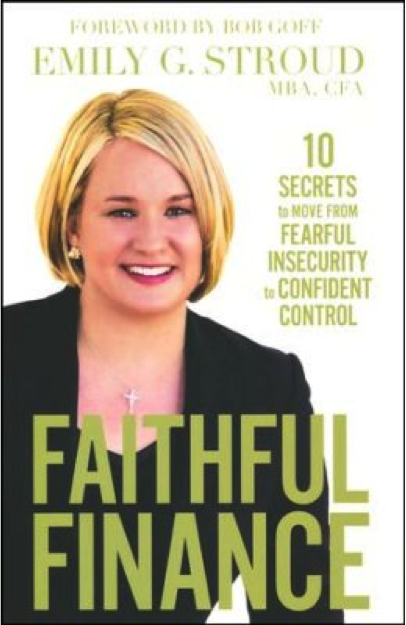Financial advisor Emily G. Stroud is a mom, businesswoman, and entrepreneur. She has two decades of experience with helping people make smart choices about money. She knows that money can be one of the great causes of stress in life — but that it doesn’t have to be that way. Finances, in fact, can be a great source of joy, security, and hope.
In Faithful Finance, Emily comes alongside you to:
- Develop a savings plan based on your unique goals
- Make a monthly budget that actually works for you
- Reduce your overall debt burden
- Plan for your children’s college years
- Insure your life without fear
- Leave a legacy through estate planning
- Encourage you to give generously
- And most importantly, discover the source of true wealth
Presented in a conversational style, this practical guide offers ten life-changing secrets that work in every financial situation, for every income level, at every stage of life. With engaging stories and practical examples, Emily empowers you to make choices that will allow you and your loved ones to enjoy financial freedom for years to come.
- Quote: “As a financial advisor, I don’t just manage money, I manage relationships with people.” (21)
- Quote: “Your financial advisor should be a person you truly like and want to spend time with.” (33)
- Note: This chapter discusses multiple ways to find a good financial advisor. It also describes all the characteristics to look for when searching for someone to control your money.
- Note: This chapter also goes over a comprehensive financial plan and to make one that is realistic. This includes savings, tithing, debt, etc.
- Quote: “In order for a budget to actually work and benefit your family, it has to be tailored to your unique lifestyle and situation.” (40)
- Quote: “I want to encourage you to see creating a budget as a way to be responsible and respectful of the resources that [have been] entrusted you.” (38)
- Note: Creating a budget is crucial if you want to be able to pay bills on time and avoid debt. Proper planning can be key in avoiding turmoil.
- Note: It is important to keep some cash on hand for emergencies instead of relying on credit for everything. You can make a plan for unforeseen occurrences.
- Quote: “The best news I have for you is that our God is a good gift giver.” (54)
- Quote: “I do believe it will become a true joy in your life if you’re faithful to give to God’s church and his people regularly.”
- Note: This chapter discusses setting up a plan for giving. It talks about praying to see what God is leading you to and investing in God’s kingdom.
- Note: Many are fearful that if they give they will not be able to meet their own needs. However, God is faithful and always provides when we are disciplined in giving.
-
Quote: ”Debt can be used to purchase an item that will eventually lead you to financial freedom.” (63)
-
Quote: “If we don’t learn the concept of delayed gratification, or self-control, before we become adults, we can easily get into trouble financially. Secret number four is learning to manage debt carefully in order to move from fearful insecurity to confident control of your personal finances.” (62)
-
Note: Understanding the different ways to obtain debt (borrow money) and the financial impact they have is essential to having control of personal finances.
-
Note: Learn to control your spending and not let your spending control you.
-
Quote: ”If you want to move from fearful insecurity to confident control of your personal finances, you need to have a savings plan in place.” (79)
-
Quote: ”This may sound overly simple, but there are three main ways to save: work more, want less, and save more.” (80)
-
Note: It’s never too late to start saving.
-
Note: Learn what is a need and what is a want and use that to help in spending less to save more.
- Quote: ”One of the most loving things you can do for your family is to provide for them financially when you pass away. Life insurance is designed to protect family members [from] severe financial strain at the exact time that they are grieving from the loss of a family member.” (93)
- Quote: ”Please remember that insurance never gets cheaper if you wait a year to buy it in order to save money” (109)
- Note: Life insurance is important to the overall financial plan; its value is not to be underestimated.
- Note: Eternal insurance is the most important, but life insurance holds value in this world. It is important to understand each type of life insurance policy: term life insurance, permanent life insurance, whole life insurance, universal life insurance, variable life insurance, variable universal life insurance, disability insurance, and long-term care insurance.
-
Quote: ”My professional opinion is that you can consider the practical housing needs of your family and make a wise investment with upside growth potential.” (123)
-
Quote: ”As I alluded earlier, you can sell your primary residence after owning it for two years and pay no capital gains taxes on your profit up to $250,000. If you’re married, you are exempt from capital gains taxes on profit up to $500,000. Please note that this tax law does not apply to second homes or investment properties. If you have a mortgage on your home, the interest and property taxes you pay while you own the home are both tax deductible. Your home can be one of your largest assets and also one of your most tax efficient investments.” (123)
-
Note: Make sure that you have enough money for a down payment before starting to look for a home.
-
Note: Be realistic.
- Quote: “If you ever have an advisor guarantee you anything, please be skeptical.” (139)
- Quote: “I also want to empower you to think boldly and outside of the box about investing your most precious commodity, your time.” (165)
- Note: The five types on investments that generate passive income are dividend-yielding stocks, rental properties, loyalties, affiliate marketing, and peer-to-peer lending.
- Note: The chief difference between an investor and a speculator is that speculators try to hit it big by investing in new products or ideas, where an investor takes a more conservative, long-term approach to growing their wealth.
- Quote: “According to the College Board, the average annual cost of tuition for 2016-2017 was $33,840 at private colleges, $9,650 for state residents at public universities, and $24,930 for out-of-state residents attending public universities.” (169)
- Quote: “The advantage of going this route [mutual funds] is that if your child ends up not going to college, you will not incur any tax penalty to withdraw this money for other uses.” (177)
- Note: The main ways to save for your child’s future college are prepaid tuition 529 plans, universal life insurance, mutual funds, and setting strict parameters your child must follow in order for you to continue paying for their schooling.
- Note: The prepaid tuition 529 plans seem like the best option, since they lock in the current cost of schooling, eliminating the extreme inflation of tuition rates, but must be purchased on the state plan in which they will be used.
-
Quote: “Wills normally address the distribution of the majority of your assets, but there are a variety of items that are not covered by the instructions in a will. Such items include: community property, process from life insurance policy payouts, retirement assets, assets owned as joint tenants with rights of survivorship, investment accounts that are designed as ‘transfer on death.’” (183)
-
Quote: “Proper estate planning and a well-designed will can minimize the tax liability of an individual’s estate.” (185)
-
Note: There are a variety of estate planning documents: a basic will, beneficiary forms, financial power of attorney, heath care power of attorney, living will, inventory of investment assets, list of contacts, guide to digital assets, funeral arrangements, and trusts.
-
Note: There is a federal estate tax on your assets and property before they are transferred to your heirs after death, but only assets totaling more than $5.49 million for an individual, or $10.98 million for married couples, are taxed by this estate tax in the US.

